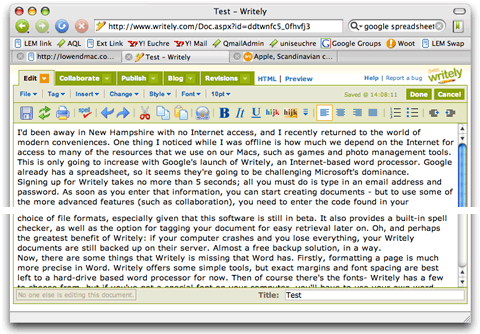I'd been away in New Hampshire with no Internet access, and I
recently returned to the world of modern conveniences. One thing I
noticed while I was offline is how much we depend on the Internet for
access to many of the resources that we use on our Macs, such as games
and photo management tools.
This is only going to increase with Google's launch of Writely [since integrated into Google
Docs], an Internet-based word processor. Google already has a spreadsheet, so it seems they're
going to be challenging Microsoft's dominance.
A Free Word Processor
Signing up for Writely takes no more than 5 seconds; all you have to
do is type in an email address and password. As soon as you enter that
information, you can start creating documents - but to use some of the
more advanced features (such as collaboration), you need to enter the
code found in your confirmation email.
The program assumes you're familiar with the Windows version of
Microsoft
Word, as the toolbar icons are very similar. It has it's own set of
menus that you can use to alter the document you're working on. And, as
with Word, you can insert images and tables directly into the
document.

The big feature that Writely boasts over Word is collaboration. You
can work on a document along with several other people without
having to deal with the complications of passing around a Word
document. Traditionally, one would type up a Word document, set it to
track changes, email it to Person A, who would edit it and email it to
Person B, who would edit it and email it to Person C, and so on,
eventually making it back to you.
This brings up the immediate question: "What if Person B wants to
add to something person C added?" With a traditional Word document and
email distribution, this wouldn't happen - or if it did, it would take
the extra step of emailing it back to Person B.
Writely believes it has a better answer: Make the document editable
by anyone you give permission to. It also lets you see who edited which
section - a truly excellent idea, but will it catch on?
Firstly, the look is very much like Windows. Mac users may be
uncomfortable with this, as many who choose the Mac dislike the way
Windows looks and feels.

The key to Writely's success is compatibility. I've had no problems
using with Writely on Firefox,* and it allows users to save their
documents as Word files, RTF files, OpenOffice documents, PDFs, or even
HTML files. This is an excellent choice of file formats, especially
given that this software is still in beta.
- * Writely supports Internet Explorer 5.5 and later
on Windows as well as Mozilla 1.4 or later and Firefox 1.5 and later on
Windows and OS X. Camino is not mentioned, but it does work.
Safari, Internet Explorer 5 or earlier, Netscape 4 or earlier, Opera,
and SeaMonkey are not supported. iCab 3.0. and OmniWeb 5.1.3 are not
mentioned, and Writely doesn't work with either. dk
Writely also provides a built-in spell checker, as well as the
option for tagging your document for easy retrieval later on.
And perhaps the greatest benefit of Writely: If your computer
crashes and you lose everything on your hard drive, your Writely
documents are still backed up on Google's server. Almost a free backup
solution, in a way.
Missing Features
There are some things that Writely is missing that Word has.
Firstly, formatting a page is much more precise in Word. Writely
offers some simple tools, but exact margins and font spacing are best
left to a hard-drive based word processor for now.
Then there are the fonts: Writely has a few to choose from, so if
you've got a special font on your computer, you'll have to use your own
word processor to choose it.

Writely also lacks the page layout view, which I find very helpful
for determining what your printed page will look like before you do a
print preview. And Writely doesn't have the "notebook" layout option
that Microsoft Word does.
Taking on Microsoft
Apple never really attempted to attack Microsoft head-on, but it
appears that Google might be doing just that. In a technology world
where innovation and adaptation to changing computing lifestyles is
key, Google seems to have the advantage.
Ever since 802.11b/g wireless became the standard for Internet
access on laptop computers, people have started to take being online
for granted. Google is using this to their advantage, and my guess is
that Microsoft will have no choice but to follow in some form or
another.
Writely's not perfect, and I don't plan on using it for much at
present. Still, it's nice to know that it's there in case I need it -
should Word become corrupt and need to be reinstalled, for instance.






